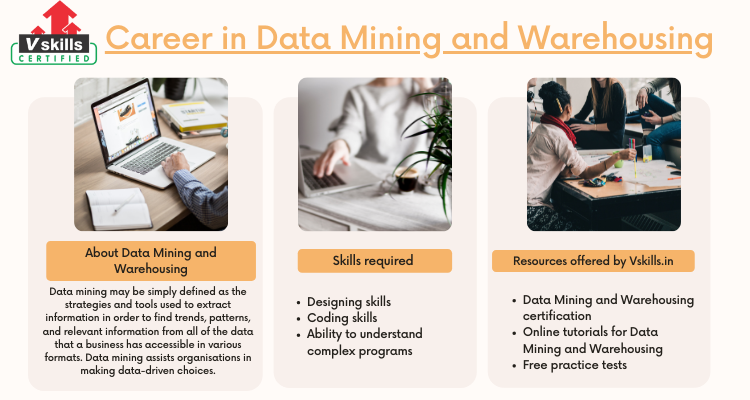Organizational decision-making is inextricably linked to Data Mining and Warehousing. Companies, large and small, are empowering knowledge workers (Senior Executives, Analysts, and Data Owners) to make quick, tactical, and outcome-focused choices based on large-scale data analytics. The days of using DBMS-based systems for data assimilation, storage, retrieval, and processing are long gone.
Let us know about Career in Data Mining and Warehousing!
About Data Mining and Warehousing
Data mining may be simply defined as the strategies and tools used to extract information in order to find trends, patterns, and relevant information from all of the data that a business has accessible in various formats. Data mining assists organisations in making data-driven choices. Data mining may also be defined as the process of uncovering hidden information in data in order to classify it as relevant data.
Data Mining and Warehousing: Roles and Responsibilities
After becoming a successful Data Mining and Warehousing expert you will be responsible for extracting and analyzing data. You will work with a database system that is designed for analytical analysis instead of transactional work. Moreover, as a data miner, you will be working in fields such as market analysis and management, fraud detection, corporate analysis, and risk management.
Eligibility
- A data warehouse engineer should have a bachelor’s degree in computer science, information technology, data science/statistics, or a related subject to pursue a career in data warehousing. Prior job experience that is comparable is also acceptable. You should have at least two years of SQL server coding and management expertise. He or she should also be knowledgeable with server integration and ETL technologies.
- A data warehouse engineer should be familiar with dimensional modelling and other data warehousing techniques in order to pursue a career in the field. Excellent understanding of how to build up cross-functional and relational databases. Not only should the candidate be familiar with ETL, but also with Tableau or any other analytics platform (SpagoBI) You must have excellent abilities in Microsoft Word, PowerPoint, Excel, MS Project, MS Visio, and MS Team Foundation Server, which will aid in the creation of effective data designs as well as documentation and reporting processes across multiple business modules.
Career prospects
Data warehousing is utilised in the banking sector for risk management, as well as evaluating customer data, market trends, and, most significantly, decision making ( particularly in loan departments). Data warehousing is used in the banking industry to evaluate customer spending patterns and maximise client profit.
Data warehousing is used in the healthcare sector to separate patient data so that it may be supplied to insurance companies when requested. It also aids in the secure management of personnel records and financial activities. Data warehousing is used in the insurance business to analyse data patterns and consumer trends in order to create tailored policies for customers (custom made policies for each individual customers).
Data warehousing is used in the services industry to keep track of client profiles, resource management revenue trends, and financial records. Data warehousing is utilised in the transportation sector to store and preserve crew data on board as well as financial information for pricing schemes. This also saves consumer information, allowing campaigners to test their marketing technique on a small group of people.
As a novice, you can take on any job title as long as your first assignment involves working with databases. Depending on whether you want to write code or manage operations, your next logical step should be to work on DWBI as a developer or administrator. After that, you may concentrate on data mining, which is a critical employment function these days, particularly in larger companies. The icing on the cake would be to become an expert in predictive analysis. This development, which includes BI skills for good measure, may solidify your position as a professional who is important to a company’s revenues and future.
Salary Insights
You may expect to make approximately $350,000 per year as a data mining analyst if you are just starting out or have less than a year of experience in the industry. You may expect to earn $4,83,000 per year if you have 1-4 years of experience. Compensation for data mining analysts with 5-9 years of expertise is about $720,000 per year. Candidates with 10 to 19 years of experience may expect to earn about $1275,000 per year.
Scope
What makes data warehousing a field to keep an eye on is that, in the past, only large companies could use data to predict their own growth, but with advancements in computing (such as AWS, Hadoop, and others), even smaller emerging companies can now benefit from this practise, and thus the demand for data warehouse engineers has grown exponentially. A firm is lost in the market nowadays without adequate analysis, and if analysis is the heart of the company, data is the blood.
Resources for Data Mining and Warehousing
Before you can become an expert in desired areas, you must first build a solid base. Before you can move on to practical teaching, you’ll need to have the right applied skills. To gain better understanding of the domain, you can use the following tools:
- Firstly, Online Tutorials for Data Mining and Warehousing
- Also, Certification Courses from verified sources such as Vskills, Coursera, Udemy and so on.
- In addition, Online communities
- Moreover, Blogs and study material from experts in this field and many more.
Here are some examples of how you can improve your abilities:
- Freelancing
- Internships
- Apprenticeship programs
The above steps will help you to get this domain started. It’s a long way to go, however. You can take an advanced course to reach a new level of skills.
Some resources offered by Vskills
Vskills offer Data Mining and Warehousing professional certification for all those interested in working in this field or in advancing their career. This certification course covers the following topics –
- Data Warehousing Models & Architecture
- Data Warehousing Operational Systems
- Clustering And Nearest-Neighbor Prediction
- Machine Learning
- Decision Tress
- Neural Networks
- Data Mining Algorithms
- On Line Analytical Processing (OLAP)
Vskills also offers free practice tests and online tutorials to supplement the learning process. You can check them by clicking on the following links –
Discover the career opportunities and other prospects of Career as Data Mining and Warehousing. Hurry up and start preparing now with Vskills.in!




